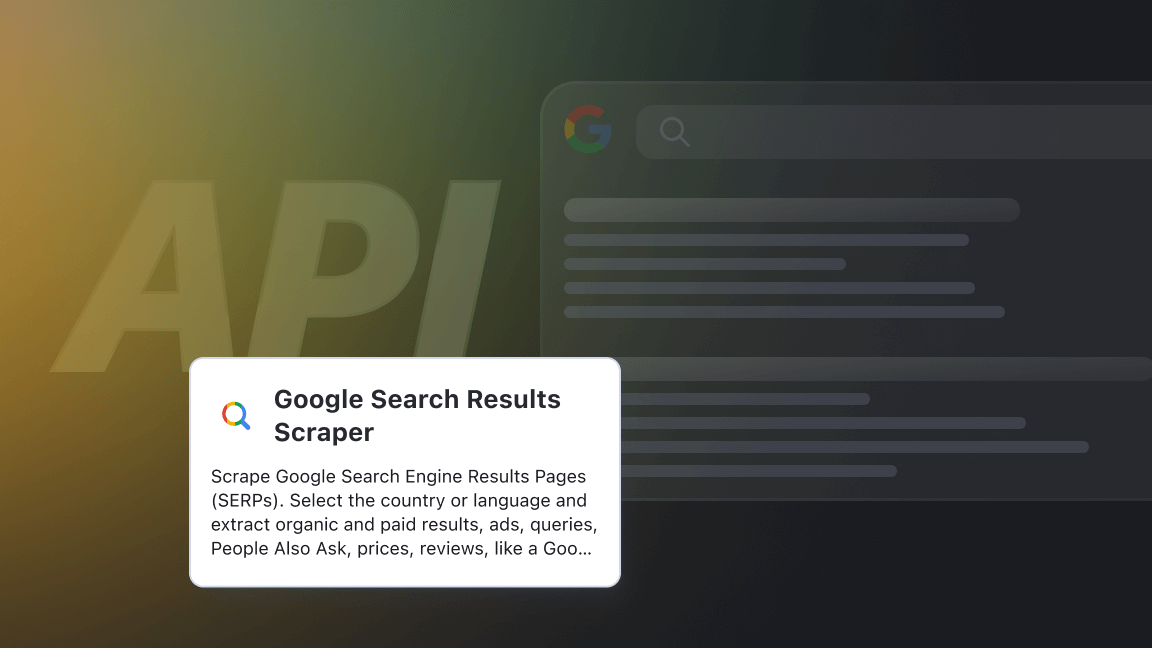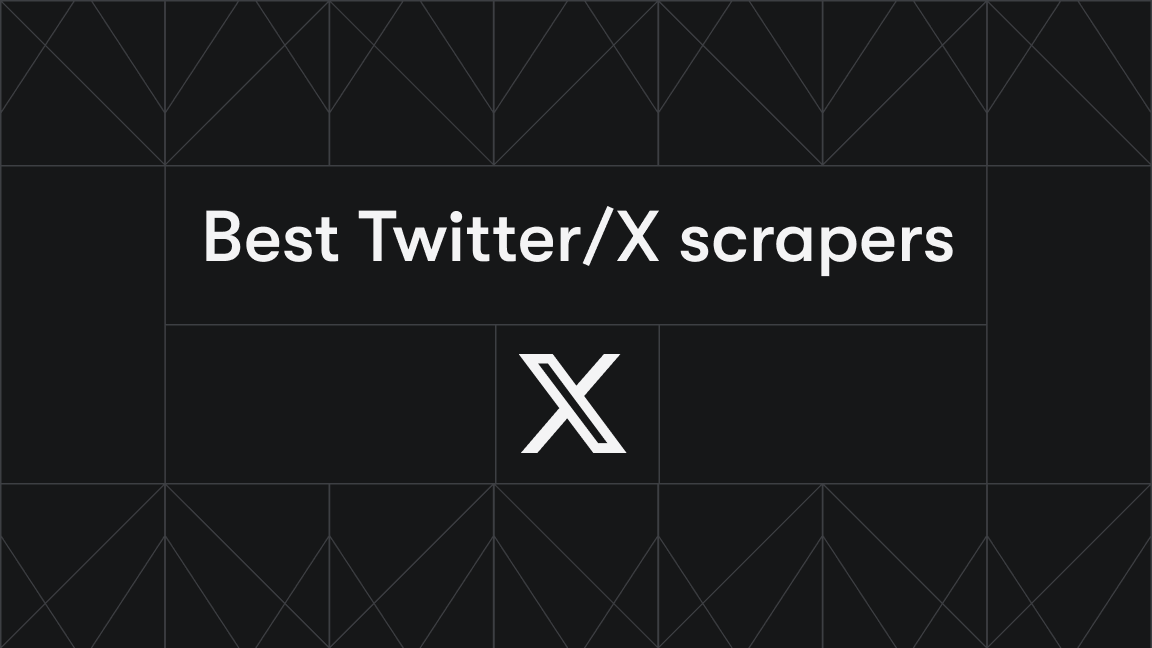Web scraping is the art of getting bots to emulate user behavior online to open websites and retrieve their data. Humans don't request 50 pages per second from one website. So to extract lots of pages from one site without getting blocked, your requests need to look like they're coming from different IP addresses and even from various ISPs and locations around the world. That's why proxies are necessary for successful web scraping.
While proxies are not very expensive, costs can rise rapidly if you're making tens of thousands of requests per day to the same website. That's why we've identified the best proxy providers in 2026 based on cost and performance.
- Methodology: All pricing was sourced from provider pricing pages in February 2026. Monthly billing only - annual plans excluded. The residential table shows the optimal cost (the cheapest plan for each volume tier). Non-residential tables show Start (entry price) and Best (highest volume discount). Custom and enterprise pricing are excluded. Evomi data was sourced from third-party reviews.
Why we care
Apify is a web scraping platform. It gives developers easy access to serverless computation, data storage, distributed queues, and hundreds of web scraping APIs built by other developers.
While Apify doesn't run its own proxy infrastructure, Apify Proxy wraps multiple third-party providers (including some of those in our list) and balances between them for higher reliability. If one provider fails, requests are routed to others, making it more dependable than relying on a single source.
- Related: According to Apify's state of web scraping report 2026, 43.1% of web scraping pros now use 2–3 proxy providers, and 12.1% rely on 4–5 providers. This multi-provider approach reflects the need for redundancy, flexibility, and risk mitigation when scraping protected websites.
Best proxy providers by proxy type
We've split pricing into three focused tables so you can quickly compare providers for the proxy type you need. All prices are regular list rates on monthly billing (no annual commitments). Promotional discounts are mentioned in individual provider profiles below.
Residential proxies
Each cell shows the optimal monthly cost for that bandwidth target - picking the cheapest available plan at each volume tier.
| Provider | 5 GB | 50 GB | 100 GB | 500 GB ★ | 1,000 GB |
|---|---|---|---|---|---|
| Bright Data | $40.00 | $400.00 | $700.00 | $2,500.00 | $5,000.00 |
| DataImpulse Cheapest | $5.00 | $50.00 | $100.00 | $500.00 | $800.00 |
| Evomi* | $4.95 | $49.00 | $49.00 | $245.00 | $490.00 |
| Infatica | $20.00 | $192.00 | $360.00 | $1,350.00 | $2,600.00 |
| IPRoyal | $24.50 | $245.00 | $490.00 | $2,450.00 | $4,900.00 |
| Massive | $39.95 | $375.00 | $490.00 | $2,000.00 | $3,200.00 |
| NetNut | N/A | $176.50 | $345.00 | $1,425.00 | $2,490.00 |
| Oxylabs | $40.00 | $375.00 | $698.00 | $2,750.00 | $4,000.00 |
| Ping Proxies | N/A | $150.00 | $275.00 | $1,375.00 | $2,750.00 |
| Rayobyte | $17.50 | $100.00 | $200.00 | $750.00 | $900.00 |
| Smartproxy | $17.50 | $175.00 | $350.00 | $1,750.00 | $3,000.00 |
| SOAX | N/A | $170.00 | $340.00 | $1,230.00 | $2,000.00 |
| Webshare | $35.00 | $275.00 | $450.00 | $2,250.00 | $4,500.00 |
| ★ Most popular volume tier · * Evomi uses a flat pay-as-you-go rate · N/A = plan not available at that volume | |||||
- Takeaway: Excluding Evomi (due to filter multipliers), DataImpulse is the cheapest residential provider at $0.80-1.00/GB with straightforward pay-as-you-go pricing. Rayobyte is very competitive at scale ($0.90/GB at 1,000 GB). Among the larger established providers, SOAX offers the best volume pricing at $2.00/GB for 1,000 GB.
Datacenter proxies
Prices shown as Start / Best - the unit price on the smallest plan and the unit price at the highest volume tier.
| Provider | Shared (per IP) | Shared (per GB) | Dedicated (per IP) |
|---|---|---|---|
| Bright Data | $1.40 / $0.90 | $0.60 / $0.42 | $2.20 / $1.30 |
| DataImpulse | — | $0.50 / $0.45 | — |
| Evomi | — | $0.45 / $0.30 | — |
| Infatica | — | $0.60 / $0.30 | $1.00 / $1.00 |
| IPRoyal | — | — | $1.57 / $1.39 |
| NetNut | — | $1.00 / $0.49 | — |
| Oxylabs | — | $0.65 / $0.44 | $2.25 / $1.20 |
| Ping Proxies | — | — | $2.00 / $1.60 |
| Rayobyte | $1.00 / $1.00 | $0.60 / $0.45 | $3.75 / $2.50 |
| Smartproxy | $0.035 / $0.020 | $0.60 / $0.38 | $1.85 / $1.35 |
| SOAX | — | $0.62 / $0.40 | — |
| Webshare | $0.030 / $0.018 | — | — |
- Takeaway: For shared datacenter IPs priced per address, Webshare and Smartproxy are way cheaper than everyone else ($0.02-0.03/IP vs. $0.90+ elsewhere). For datacenter bandwidth pricing, Evomi and Infatica both reach $0.30/GB at volume. For dedicated datacenter IPs, Infatica leads at a flat $1.00/IP, with Oxylabs competitive at $1.20/IP at scale.
Mobile, ISP, and SERP proxies
| Provider | Mobile (per GB) | ISP dedicated (per IP) | ISP (per GB) | SERP (per 1k req) |
|---|---|---|---|---|
| Bright Data | $8.00 / $5.00 | $3.50 / $2.50 | $8.00 / $5.00 | $1.50 / $1.00 |
| DataImpulse | $2.00 / $1.60 | — | — | — |
| Evomi | $4.00 / $2.20 | $1.00 / $1.00 | — | — |
| Infatica | $8.00 / $4.00 | $1.95 / $1.95 | — | $0.28 / $0.08 |
| NetNut | $16.00 / $8.00 | — | $14.40 / $4.50 | $1.20 / $1.20 |
| Oxylabs | $13.75 / $8.33 | $1.60 / $1.20 | — | — |
| Rayobyte | $25.00 / $15.00 | $5.00 / $4.60 | $7.50 / $5.00 | — |
| Smartproxy | $8.00 / $4.50 | $3.33 / $2.00 | $3.00 / $1.30 | $1.26 / $0.08 |
| SOAX | $3.60 / $2.00 | — | — | — |
| Webshare | — | $0.30 / $0.225 | — | — |
Providers not shown (IPRoyal, Massive, Ping Proxies) have limited or no offerings in these categories. IPRoyal offers mobile proxies priced per IP/month ($117-130 with unlimited bandwidth) rather than per GB.
- Takeaway: DataImpulse dominates mobile pricing at $1.60-2.00/GB - less than half the cost of most competitors. For ISP dedicated IPs, Webshare is far cheaper at $0.225-0.30/IP (5-10x less than others). Smartproxy leads ISP bandwidth pricing at $1.30-3.00/GB. For SERP proxies, Infatica and Smartproxy both reach $0.08/1k requests at volume, with Infatica offering the cheapest entry point at $0.28/1k.
Best proxy providers in 2026 by category
| Category | Winner | Price | |||
|---|---|---|---|---|---|
| Cheapest residential (small volume) | DataImpulse** | $5.00 for 5 GB | |||
| Cheapest residential (high volume) | DataImpulse | $800 for 1,000 GB ($0.80/GB) | |||
| Cheapest datacenter IPs | Webshare | $0.018–0.030/IP | |||
| Cheapest datacenter bandwidth | Evomi / Infatica | $0.30/GB at volume | |||
| Cheapest dedicated datacenter | Infatica | $1.00/IP flat | |||
| Cheapest mobile | DataImpulse | $1.60–2.00/GB | |||
| Cheapest ISP (per IP) | Webshare | $0.225–0.30/IP | |||
| Cheapest ISP (per GB) | Smartproxy | $1.30–3.00/GB | |||
| Cheapest SERP | Infatica / Smartproxy | $0.08/1k at volume | |||
| ** Evomi is technically cheaper ($4.95/5 GB), but filter multipliers make their effective cost unpredictable for most use cases. | |||||
Best proxies for large-scale operations
Enterprise customers demand rigorous SLAs, certifications, and flawless proxy networks. Oxylabs' proxies rarely falter and often deliver speeds multiple times faster than the competition. Its vast proxy pools and continuous upgrades - like coordinate-level targeting, lower rates, and enhanced performance - keep it ahead, even as other vendors struggle to catch up.
- Key pricing: Residential from $40/5 GB ($4.00/GB at 1,000 GB). Datacenter shared from $0.44/GB. Datacenter dedicated from $1.20/IP. Mobile from $8.33/GB. ISP dedicated from $1.20/IP.
- Promo: 50% off residential with code OXYLABS50. 40% off mobile with code OXYLABS40.
- Coverage gaps: No ISP bandwidth pricing, no SERP proxies.
Best platform for proxies
Bright Data consistently delivers high-quality proxy servers backed by expansive, feature-rich pools that drive its unified platform. Critics point to its complexity, yet its integrated design - combining account-based pricing, a single API for all proxies, and tools like Proxy Manager - resolves the common pain of juggling multiple systems. This comprehensive approach leaves competitors years behind.
- Key pricing: Residential from $40/5 GB ($5.00/GB at 1,000 GB). Datacenter shared from $0.42/GB. Datacenter dedicated from $1.30/IP. Mobile from $5.00/GB. SERP from $1.00/1k requests.
- Promo: 50% off residential with code RESIGB50.
Best value provider
Smartproxy offers competitive pricing across every proxy type - residential, datacenter, mobile, ISP, and SERP - a rare combination. Its residential 5 GB plan comes in at $17.50, with the 1,000 GB tier at $3,000.00. ISP bandwidth pricing ($1.30-3.00/GB) is the cheapest available, and SERP pricing reaches $0.08/1k at volume, tied with Infatica for the lowest.
Smartproxy also has the most aggressive promotional discounts. With the NOIDEA67 code, residential pricing drops by 67%, bringing 5 GB down to $10 and 1,000 GB down to $1,500.
- Key pricing: Residential from $17.50/5 GB ($3.00/GB at 1,000 GB). Datacenter shared from $0.020/IP or $0.38/GB. Datacenter dedicated from $1.35/IP. Mobile from $4.50/GB. ISP from $1.30/GB. SERP from $0.08/1k.
- Promo: 67% off residential (NOIDEA67). 50% off mobile. 30% off SERP Advanced tier (SCRAPE30).
Cheapest datacenter IPs
Webshare delivers the lowest pricing for shared datacenter proxies - with shared IPs starting at $0.030 (and $0.018 for large orders). Its ISP dedicated IPs ($0.225-0.30/IP) are also 5-10x cheaper than every other provider.
If your scraping targets don't require residential-quality IPs, Webshare's datacenter pricing is unbeatable. Its residential pricing ($4.50-7.00/GB) is expensive, but that's not where it competes.
- Key pricing: Residential from $35/5 GB ($4.50/GB at 1,000 GB). Datacenter shared from $0.018/IP. ISP dedicated from $0.225/IP.
- Promo: 50% off residential (ongoing promotion).
- Coverage gaps: No datacenter bandwidth pricing, no dedicated datacenter, no mobile, no ISP bandwidth, no SERP.
Cheapest mobile proxies
DataImpulse is the price leader in two of the most important categories: mobile proxies ($1.60-2.00/GB) and residential proxies ($0.80-1.00/GB). Its pricing model is simple pay-as-you-go with no minimum commitments, which makes it easy to try.
The trade-off is product coverage. DataImpulse doesn't offer ISP proxies, SERP proxies, or dedicated datacenter IPs. If you only need residential and mobile, the savings are substantial - its mobile pricing is less than half what most established providers charge.
- Key pricing: Residential from $5/5 GB ($0.80/GB at 1,000 GB). Datacenter shared from $0.45/GB. Mobile from $1.60/GB.
- Promo: None - already the cheapest at list price.Coverage gaps: No ISP, no SERP, no datacenter dedicated.
- Coverage gaps: No ISP or SERP proxies or dedicated datacenter IPs.
Cheapest SERP proxies
Infatica offers the cheapest entry point for SERP proxies at $0.28/1k requests, dropping to $0.08/1k at volume (tied with Smartproxy). It also stands out for the widest product range among newer providers - including datacenter dedicated IPs ($1.00/IP flat, the cheapest available) and SERP proxies, which most smaller providers skip.
Its residential pricing is mid-range ($2.60-4.00/GB), so it's not the budget pick there. But if you need a single newer provider that covers the most ground, Infatica is the one.
- Key pricing: Residential from $20/5 GB ($2.60/GB at 1,000 GB). Datacenter dedicated at $1.00/IP flat. SERP from $0.28/1k requests ($0.08/1k at volume). Mobile from $4.00/GB.
- Promo: None.
Competitive mobile pricing
SOAX offers competitive mobile proxy pricing with a starting rate of $3.60/GB and $2.00/GB at high usage - making it the second most cost-effective option for mobile traffic after DataImpulse. Its residential pricing at scale is also strong at $2.00/GB for 1,000 GB.
Its product range is narrower than the big players - no datacenter per-IP pricing, no dedicated datacenter IPs, no ISP, and no SERP. But for scraping operations focused on residential and mobile, SOAX's pricing is hard to beat among established providers. Like NetNut, it doesn't offer plans below 25 GB.
- Key pricing: Residential from $170/50 GB ($2.00/GB at 1,000 GB). Datacenter shared from $0.40/GB. Mobile from $2.00/GB.
- Promo: None.
- Coverage gaps: No datacenter per-IP, no dedicated datacenter, no ISP, no SERP. Minimum 25 GB residential.
Competitive SERP pricing
NetNut offers flat SERP proxy pricing at $1.20 per 1,000 SERPs regardless of volume - no surprises and no tiers to navigate. Its residential pricing is also competitive at scale, reaching $2.49/GB at 1,000 GB, and it's one of the few providers offering ISP bandwidth pricing (though at $4.50-14.40/GB, it's significantly more expensive than Smartproxy's $1.30-3.00/GB).NetNut doesn't offer small plans (residential starts at 28 GB+), so it's better suited for medium-to-large operations.
- Key pricing: Residential from $176.50/50 GB ($2.49/GB at 1,000 GB). Datacenter shared from $0.49/GB. Mobile from $8.00/GB. ISP from $4.50/GB. SERP at $1.20/1k requests.
- Promo: None.
- Coverage gaps: No small residential plans (28 GB minimum), no datacenter per-IP pricing, no dedicated datacenter IPs.
Budget-friendly at scale
Rayobyte offers some of the most competitive pricing at high volumes. Its residential rate drops to $0.90/GB at 1,000 GB - only DataImpulse is cheaper among providers with straightforward pricing. It also covers every proxy type except SERP, giving it solid product breadth.
The catch is that Rayobyte's mobile pricing ($15.00-25.00/GB) is the most expensive in our comparison by a wide margin. And its datacenter dedicated IPs ($2.50-3.75/IP) aren't competitive against Infatica or Oxylabs.
- Key pricing: Residential from $17.50/5 GB ($0.90/GB at 1,000 GB). Datacenter shared from $0.45/GB. Mobile from $15.00/GB. ISP dedicated from $4.60/IP.
- Promo: None - already competitive at list price.
- Coverage gaps: No SERP proxies.
Lowest headline rates (with caveats)
Evomi advertises the lowest residential proxy rates in the market at $0.49/GB on its Core plan, and its datacenter bandwidth pricing ($0.30/GB at volume) is also among the cheapest.
However, there's a significant catch. Evomi charges multipliers for proxy filters like geo-targeting, city-level targeting, and ASN selection. These multipliers can go up to 15x on Core plans, meaning a $0.49/GB base rate could become $7.35/GB once you apply the targeting most scrapers need. The pricing data for Evomi was sourced from third-party reviews rather than directly from its pricing page, so treat these numbers with extra caution.
If your use case doesn't require geo-targeting or other filters, Evomi could genuinely be the cheapest option. But for most web scraping scenarios that need location-specific IPs, the effective cost is hard to predict.
- Key pricing: Residential from $4.95/5 GB (Core plan, before filter multipliers). Datacenter shared from $0.30/GB. Mobile from $2.20/GB. ISP dedicated from $1.00/IP.
- Promo: None.
- Coverage gaps: No datacenter dedicated IPs, no SERP proxies.
Simple pricing model
IPRoyal keeps things simple with straightforward per-unit pricing across its product line. Its dedicated datacenter IPs are competitive at $1.39-1.57/IP, and ISP dedicated IPs run $1.80-2.70/IP.
The downside is residential pricing. At $4.90/GB across all volume tiers, IPRoyal's residential proxies are among the most expensive in our comparison. Its mobile proxy model is also unusual - priced per IP/month ($117-130) with unlimited bandwidth rather than per GB, which only makes sense for very high-volume mobile use cases.
- Key pricing: Residential from $24.50/5 GB ($4.90/GB at 1,000 GB). Datacenter dedicated from $1.39/IP. ISP dedicated from $1.80/IP.
- Promo: None.Coverage gaps: No datacenter shared bandwidth pricing, no SERP proxies.
Ethical proxy sourcing
Massive differentiates itself through its consent-based proxy sourcing model. Its residential IPs come from users who have explicitly opted in, which addresses the ethical concerns around residential proxy networks that some organizations care about.
The premium for this ethical approach is significant. Residential pricing runs $3.20-7.99/GB, making Massive one of the pricier options. Its product range is also limited - no datacenter proxies, no mobile, no SERP. For compliance-conscious enterprises that need ethically sourced IPs and can absorb the cost, Massive fills a unique niche.
- Key pricing: Residential from $39.95/5 GB ($3.20/GB at 1,000 GB). ISP dedicated from $1.80/IP.
- Promo: None.
- Coverage gaps: No datacenter proxies (shared or dedicated), no mobile, no SERP.
Clean volume pricing
Ping Proxies is a smaller provider with a clean volume discount structure. Residential pricing at $2.75-3.25/GB puts it in the mid-range, and its dedicated datacenter IPs ($1.60-2.00/IP) are reasonably priced.
Like NetNut, it doesn't offer very small plans (residential starts at 10 GB+). Its product range is limited - no datacenter shared proxies, no mobile, and no SERP.
- Key pricing: Residential from $150/50 GB ($2.75/GB at 1,000 GB). Datacenter dedicated from $1.60/IP. ISP dedicated from $2.75/IP.
- Promo: None.
- Coverage gaps: No datacenter shared proxies, no mobile, no SERP.
One proxy service is not enough
One third-party provider is rarely enough for large web scraping projects. Apify Proxy combines multiple providers and smartly rotates datacenter and residential IP addresses to improve the performance of your scrapers.
It's included with every Apify plan, including the free one. No need to pay extra for proxies.
Note: This evaluation is based on our understanding of information available to us as of February 2026. Readers should conduct their own research for detailed comparisons. Product names, logos, and brands are used for identification only and remain the property of their respective owners. Their use does not imply affiliation or endorsement.
FAQs
What is a proxy?
A proxy is a program or server that acts as an intermediary between your device and the web pages you access on the internet. Proxies protect computers from malware and unwanted access from third parties. Proxies also let you bypass geo-location protections by using proxies in a specific country.
What is a web scraping proxy?
In web scraping, proxies are used to disguise the identity of bots accessing a website. Clients forward requests to a proxy server, which delivers the requests to the destination server. The response is returned to the client via the proxy. Proxies obfuscate your online identity and allow you to rotate your IP address to reduce the likelihood of your web scraping activities getting detected. They also enable you to send more requests to extract the data you need.
What is a datacenter proxy?
Datacenter proxies are a fast and cheap way to mask your real IP address so you can access a website anonymously and bypass web scraping protections. Your request to a website will go through a server in a datacenter, and the target website will see the datacenter's IP address instead of yours.
What is a residential proxy?
Residential proxies use IP addresses assigned by internet service providers to the homes and offices of real users. Unlike datacenter proxies, traffic from residential proxies is indistinguishable from that of legitimate users. This solution allows you to access a larger pool of servers than a datacenter proxy. This makes it a better option when you need a large number of different IP addresses.
How do you use a proxy for web scraping?
Web scraping can work around IP address-based blocking by rotating the IP addresses from which they send the requests to target websites. This can be done by using a pool of proxy servers by assigning each request to another proxy server from the pool, so it looks like a request coming from another user. The proxies can be selected either randomly or in a round-robin fashion. If too many requests are sent from a single proxy in too short a period of time, the proxy might get "burned", which means all further requests from it are blocked. For successful large-scale scraping activities, you need a sufficient pool of proxies and to time the workload to maximize the scraping throughput while burning proxies.







